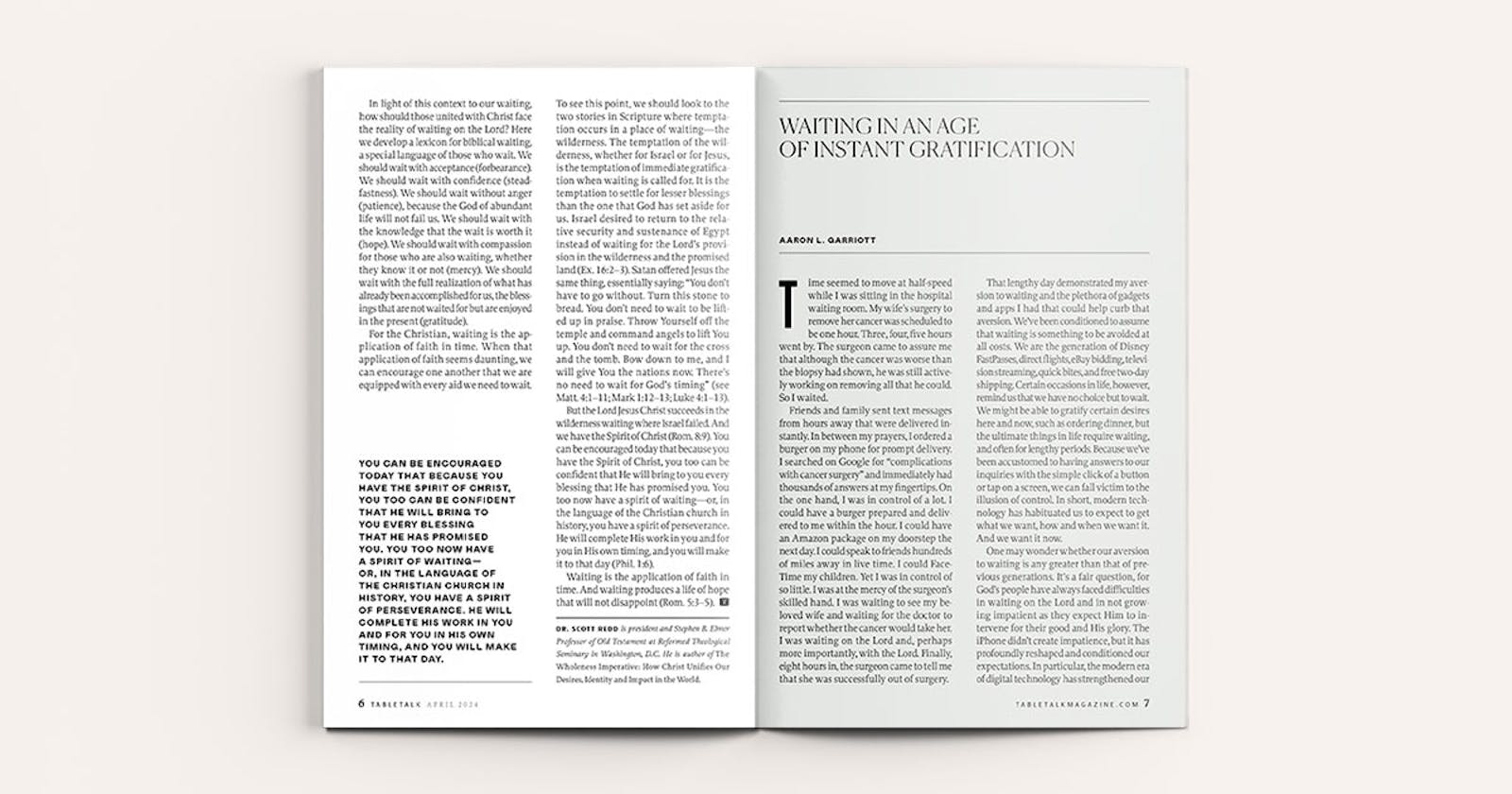
Request your free, three-month trial to Tabletalk magazine. You’ll receive the print issue monthly and gain immediate digital access to decades of archives. This trial is risk-free. No credit card required.
Try Tabletalk NowAlready receive Tabletalk magazine every month?
Verify your email address to gain unlimited access.
Time seemed to move at half-speed while I was sitting in the hospital waiting room. My wife’s surgery to remove her cancer was scheduled to be one hour. Three, four, five hours went by. The surgeon came to assure me that although the cancer was worse than the biopsy had shown, he was still actively working on removing all that he could. So I waited.
Friends and family sent text messages from hours away that were delivered instantly. In between my prayers, I ordered a burger on my phone for prompt delivery. I searched on Google for “complications with cancer surgery” and immediately had thousands of answers at my fingertips. On the one hand, I was in control of a lot. I could have a burger prepared and delivered to me within the hour. I could have an Amazon package on my doorstep the next day. I could speak to friends hundreds of miles away in live time. I could FaceTime my children. Yet I was in control of so little. I was at the mercy of the surgeon’s skilled hand. I was waiting to see my beloved wife and waiting for the doctor to report whether the cancer would take her. I was waiting on the Lord and, perhaps more importantly, with the Lord. Finally, eight hours in, the surgeon came to tell me that she was successfully out of surgery.
That lengthy day demonstrated my aversion to waiting and the plethora of gadgets and apps I had that could help curb that aversion. We’ve been conditioned to assume that waiting is something to be avoided at all costs. We are the generation of Disney FastPasses, direct flights, eBay bidding, television streaming, quick bites, and free two-day shipping. Certain occasions in life, however, remind us that we have no choice but to wait. We might be able to gratify certain desires here and now, such as ordering dinner, but the ultimate things in life require waiting, and often for lengthy periods. Because we’ve been accustomed to having answers to our inquiries with the simple click of a button or tap on a screen, we can fall victim to the illusion of control. In short, modern technology has habituated us to expect to get what we want, how and when we want it. And we want it now.
One may wonder whether our aversion to waiting is any greater than that of previous generations. It’s a fair question, for God’s people have always faced difficulties in waiting on the Lord and in not growing impatient as they expect Him to intervene for their good and His glory. The iPhone didn’t create impatience, but it has profoundly reshaped and conditioned our expectations. In particular, the modern era of digital technology has strengthened our expectations for instant gratification of our desires and, conversely, instant relief of our pain and suffering. If I’m hungry, I can order a cheeseburger. If my back hurts, I can order relief meds. Sinful patterns are often born out of inordinate desires and quick fixes, such as that of the young man who, rather than actively waiting for a godly spouse, finds a cheap imitation on a screen. But not all time-saving conveniences are inherently bad. Modern technology can enhance efficiency, save lives, enrich fellowship, and more. Yet if we’re not careful, digital technologies can infect the soil of our minds in such a way that stunts the growth of godly patience. We can become like Esau, who considered his birthright worthless compared to the immediate need to satiate his hunger (Gen. 25:32: “What use is a birthright to me?”). Whether the “technology” is a bowl of stew or an iPad, the “Buy It Now” option in all of life may give us the illusion of control and rob us of the opportunity to wait in fellowship with God and with His people.
For me, as a waiting-averse person dwelling in an age of instant gratification, is there any hope? Cultivating a spirit of waiting (Rom. 8:23) in an age of immediacy is an upstream voyage. Nonetheless, the Spirit of sanctification who indwells us (v. 9) is not inhibited by our tech-induced hyperactivity. Let’s consider three ways to better pursue faith-waiting in an age that considers waiting an impediment.
1. reassess your tool
The history of digital media is fascinatingly complex, but let me oversimplify things by boiling it down: Whereas media used to be something that humans occasionally engaged with, media has become an integral part of life itself. Our lives have become dominated by the digital, which is designed to mitigate waiting. Netflix and YouTube have auto play—once you’re done with this episode, it’s on to the next one. (Can you believe that we used to wait a whole week between television episodes?) As Neil Postman was keen to point out, every new technology that introduces a seeming “advantage” to society also poses a corresponding disadvantage (though we rarely consider it). Since nothing is free, we always pay a price for new technology, and it’s never just monetary. In Postman’s own words, “The question, ‘What will a new technology do?’ is no more important than the question, ‘What will a new technology undo?’” When we uncritically adopt every new technology because of its perceived advantages, we fail to consider the disadvantages that it will introduce. Consider, for example, the advent of text messaging. Text messaging allows us to maintain contact with more people at farther distances. But if we’re not careful, text messaging can interfere with face-to-face contact with the people who are in our immediate communities. These considerations don’t necessarily demand a complete digital detox, but some of us may benefit from a digital purge—an honest and prayerful assessment of the tools that we may have uncritically adopted into our daily lives. All good things are worth waiting for; if we don’t have to wait for something at all, we would do well to evaluate whether that thing is worth our attention. Once we pick the best tools to accomplish our jobs, including a disciplined understanding of when and when not to use them, we’ll have more time to spend tending to the most worthwhile endeavors in life.
2. recommit to the means of grace
If the Apostolic church devoted itself to the Apostles’ teaching, fellowship, the breaking of bread, and prayers (Acts 2:42), much of the modern church has devoted itself to entertainment and therapeutic buzzes. Preaching can’t compete with the visual stimulation and the immediacy of the digital, so sermons are shortened to accommodate dwindling attention spans. The sacraments don’t meet our need for a media-induced emotional high, so the Lord’s Supper is accompanied by visual or audio stimuli to accommodate conditioned brains. But the wisdom of God challenges our assumptions and accommodations. In fact, God has made accommodations for us in the means of grace. Through the preaching of the Word, the administration of the sacraments, and prayer, the Lord keeps His appointments with us. He isn’t late, and He doesn’t keep us waiting. If we’re longing for the fulfillment of the Lord’s promise, eager to receive our promised inheritance, groaning for the redemption of our bodies, it is in and through the worship of the church that the Lord lifts us to the heavenly places to feed on Christ by faith and to enjoy communion and fellowship with Him. The Spirit, who is the “guarantee of our inheritance until we acquire possession of it” (Eph. 1:14), lifts our eyes to gaze upon God as the One worthy of our affection, our attention, and our waiting.

There is a divinely ordained superiority to the preached Word and the visible sacraments over any other medium. The Word and sacraments require waiting. As the Westminster divines taught, the sacraments require a holy waiting “upon God” (Westminster Larger Catechism 174). As we wait (and long) to hear the live preaching of the Word and to participate in the sacraments, we are like a deer that pants for flowing streams (Ps. 42:1). If we’re to cultivate this Godward panting—a spirit of waiting in the Christian life—we must recommit ourselves to meeting God where He has promised to meet us and there to be filled with heavenly anticipation and longing for God Himself. If corporate worship is just something to get through before we can get on to the long-awaited football game, we will find it difficult to wait on the Lord not only for the consummation of all things but in times of suffering as well.
3. reorient your watch
Much of the digital technology we consume is designed to get us to consider the here and now. “Look what just happened ten thousand miles away from you. This should be at the forefront of your mind!” On the other hand, the means of grace are divinely designed to get us to consider the eternal. “Set your minds on things that are above, not on things that are on earth” (Col. 3:2). Social media platforms are designed to maintain our scrolling habits so that we keep scrolling to the next attention-grabbing post, whereas the means of grace are designed by God to singularly maintain our attention on Him. Our myopic view of time requires broadening. We must resist the all-too-easy temptation to allow the world to set our watch and determine what’s worthy of our time and attention. We need to see time from God’s perspective. Not comprehensively and exhaustively, of course, but redemptive-historically or eschatologically. Peter reminds us that “with the Lord one day is as a thousand years, and a thousand years as one day. The Lord is not slow to fulfill his promise as some count slowness” (2 Peter 3:8–9). Since we are conditioned to assume that the quick is the certain, we too can unwittingly misinterpret God’s providential timing. But “the coming of the Lord is at hand,” James tells us (5:8). Therefore, we are to be patient and establish our hearts. We are to view this “light momentary affliction” as preparatory for the incomparable and eternal weight of glory that awaits us, “as we look not to the things that are seen but to the things that are unseen. For the things that are seen are transient, but the things that are unseen are eternal” (2 Cor. 4:17–18). Paul goes on:
For in this tent we groan, longing to put on our heavenly dwelling. . . . For while we are still in this tent, we groan, being burdened—not that we would be unclothed, but that we would be further clothed, so that what is mortal may be swallowed up by life. He who has prepared us for this very thing is God, who has given us the Spirit as a guarantee. (5:2–5)
Do you see what Paul is doing? He is reorienting the Corinthian Christians’ watches. He is drawing on the eschatological promise of God to inform their current situation of waiting. As the Spirit tunes our watches to see time and this life from the perspective of eternity, we are animated to wait for the Lord with courage and strength (Ps. 27:14), as those who “shall mount up with wings like eagles” and “shall run and not be weary” and “shall walk and not faint” (Isa. 40:31).
As Christians living in an age of instant gratification, we will no doubt succumb to the pleasures of Egypt from time to time. But more importantly, the Christian knows that nothing in this age can bring ultimate gratification. For that, we seek the city that is to come (Heb. 13:14).
